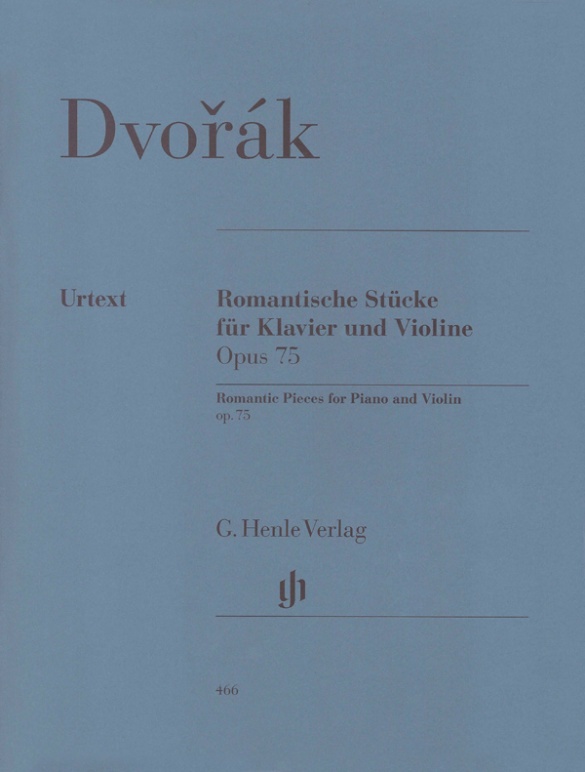

Antonín Dvorák
Pièces romantiques op. 75 pour piano et violon
La production de musique de chambre d’Antonín Dvorák englobe plus de quarante œuvres. Sans doute doit-il en grande partie le fait que sa notoriété ait franchi aussi rapidement les frontières de la Bohème aux nombreux amateurs de musique exigeants qui prenaient plaisir à jouer ses œuvres. En effet, il était très courant au 19e siècle de jouer de la musique chez soi. Les œuvres romantiques de Dvorák pour violon et piano op. 75 furent également conçues pour être jouées dans un cercle privé. La présente édition Urtext de l’op. 75 repose sur le manuscrit autographe de Dvorák. La préface donne de nombreux détails sur la genèse de cette œuvre conçue au départ comme un trio à cordes. Cette édition a été préparée avec la précieuse collaboration du spécialiste de Dvorák Milan Pospísil.
CONTENU/DÉTAILS
CONCERNANT LE COMPOSITEUR
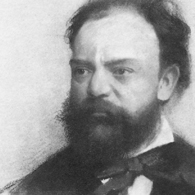
Antonín Dvorák
Il est avec Smetana le compositeur tchèque le plus illustre du XIXe s. Il a contribué à la diffusion et la reconnaissance mondiales de la musique tchèque. Parmi ses quelque 200 œuvres qui s’étendent à tous les genres habituels, figurent 9 symphonies, 14 quatuors à cordes et 12 opéras.
| 1841 | Né le 8 septembre à Nelahozeves au bord de la Moldau, fils d’un boucher et aubergiste. |
| 1853 | Fréquente l’école secondaire à Zlonice; c’est là qu’il reçoit une éducation musicale complète auprès de Josef Toman et du cantor Antonín Liehmann ; puis formation à Kamnitz (1856-57). |
| 1857–59 | Études à l’école d’orgue à Prague. Jusqu’en 1871 il gagne sa vie en tant que professeur de musique, organiste et altiste. |
| 1861 | Quintette à cordes en La mineur op. 1, sa première œuvre. |
| 1862 | Poste d’altiste solo à l’orchestre du Théâtre Provisoire (entre autres sous la direction de Smetana). |
| 1873 | Percée avec la création à Prague de l’hymne patriotique «Les Héritiers de la Montagne blanche» op. 30. Emploi à l’école de musique privée de Prague. Plusieurs bourses d’État. |
| 1874–77 | Organiste à l’église Saint-Adalbert. |
| à partir de 1876 | Les «Klänge aus Mähren» (Duos moraves) op. 20, 29, 32 et 38 (1876-77), «Rhapsodies slaves» op. 45 et la première série des «Danses slaves» op. 46 (les deux en 1878) remportent un grand succès. Sa renommée au-delà des frontières est croissante. |
| 1882 | Création de l’opéra «Dimitrij» dans la tradition du Grand Opéra. |
| 1884 | Première invitation en Angleterre. Huit autres suivront. |
| 1886 | Création de l’oratorio «Sainte Ludmilla» op. 71. |
| 1891 | Professeur de composition au conservatoire de Prague. |
| 1891–95 | Directeur du National Conservatory of Music à New York. |
| 1893 | Création à New York de la Symphonie du Nouveau Monde n° 9 op. 95 (traits de folklore américain, procédé cyclique). |
| 1901 | Création à Prague de «Rusalka», son opéra le plus célèbre. |
| 1904 | Exécution à Prague de son dernier opéra «Armida». Il meurt le 1er mai à Prague. |
About the Authors
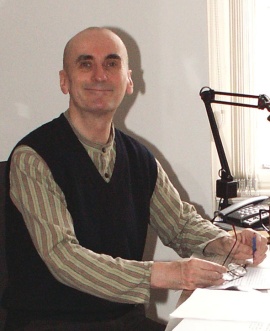
Milan Pospísil (Editeur)
Dr. Milan Pospíšil, born in 1945, studied music theory and music history at the Charles University in Prague as well as at the Ruhr-Universität in Bochum (1963–1969); in 1971 he did his doctorate there with a thesis on “Giacomo Meyerbeer: Les Huguenots. Příspěvek k analýze stylu”, and at the Czechoslovak Academy of Sciences in 1988 on “Antonín Dvořák: Dimitrij, op. 64. Kritická edice”.
He worked as a specialist and scholar at the Czechoslovak Academy of Sciences (now Academy of Science of the Czech Republic) in Prague for almost 30 years. In 1981 he co-founded the Smetana Festival and the interdisciplinary symposium on the issues of the 19th century in Pilsen, which still takes place today. Since 2000 he has been the curator and a research associate at the National Museum in Prague.

Klaus Schilde (Doigtés)
Prof. Klaus Schilde, born in 1926, spent his childhood in Dresden. There he was greatly influenced by Walter Engel, who taught him the piano (Kodaly method), composition and violin. From 1946–1948 he studied at the music conservatory in Leipzig with Hugo Steurer. After moving to the west in 1952 he studied with Walter Gieseking and Edwin Fischer, as well as with Marguerite Long, Lucette Descaves and Nadia Boulanger in Paris.
Schilde won numerous prizes. From 1947 onwards he gave concerts as a soloist and chamber musician on almost every single continent with renowned orchestras. He taught at the music conservatories in East Berlin Detmold, West Berlin, Munich, Tokyo (Geidai) and Weimar. From 1988–1991 he was President of the Staatliche Hochschule für Musik und Theater in Munich, where he also taught for decades as a professor. There are numerous radio and television broadcasts with Klaus Schilde as well as CD recordings. Schilde has contributed fingerings to almost 100 Henle Urtext editions.
Prof. Klaus Schilde passed away on 10 December, 2020.
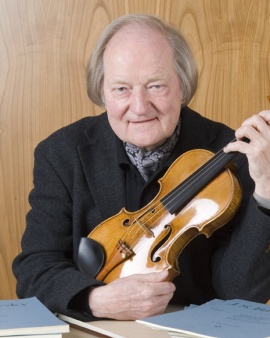
Kurt Guntner (Doigtés violon)
Prof. Kurt Guntner was born in Munich on Mozart’s 183rd birthday. He studied the violin with Ludwig Ackermann, Max Rostal and Henryk Szeryng. At the age of 18, he made his solo debut in the Kongreßsaal at the German Museum in Munich, performing Beethoven’s Violin Concerto with the Munich Philharmonic Orchestra. At the age of 22 he was appointed first concertmaster with the Bavarian State Orchestra. After 10 eventful years at the Bavarian State Opera with conductors such as Ferenc Fricsay, Joseph Keilberth and Hans Knappertsbusch, Rudolf Kempe invited him to become the first concertmaster with the Munich Philharmonic Orchestra, giving him the opportunity to perform the violin solo in many of the great violin concertos.
Of particular appeal were the BR’s invitations to perform and record great violin concertos that were seldom played, including those by Casella, Schillings, Szymanowsky. Kurt Eichhorn initiated this series– Jan Koetsier, Marek Janowski and others conducted other concertos. Kurt Guntner was also first concertmaster with the Bayreuth Festival Orchestra for many years, and played with the Munich Bach Orchestra under Karl Richter, in the Association of Soloists in The Bach Week in Ansbach and with the Münchner Bachsolisten. In 1972 he founded the internationally acclaimed ODEON-TRIO, together with the cellist Angelica May and the pianist Leonard Hokanson, touring all over the world with them for 25 years. In 1976 Guntner was called to the tenured chair of violin at Munich’s Hochschule für Musik und Theater, teaching students from around the world for 28 years.
He made numerous recordings for radio, television, record and CD. Karl Schumann described Guntner’s broad musical personality thus: “Kurt Guntner is a practical orchestral musician, soloist, chamber musician and educator in one person”.
In 1997 Kurt Guntner was awarded the order of merit (first class) of the Federal Republic of Germany.
Kurt Guntner died on 9 January 2015 in Munich.
He was closely associated with G. Henle Publishers for several decades. Since the end of the 1980s he had produced numerous Urtext editions of works for violin for the publishing house, sharing pedagogically polished bowings and fingerings for different works including violin concertos by Bach, Haydn, Mozart, Bruch and Tchaikovsky, as well as numerous other editions.
Informations sur la sécurité du produit

G. Henle Verlag
Vous trouverez ici des informations sur le fabricant du produit.G. Henle Verlag e.K.
Forstenrieder Allee 122
81476 München
Allemagne
info@henle.de
www.henle.com
recommandations
autogenerated_cross_selling
Autres éditions de ce titre
Autres éditions de ce titre


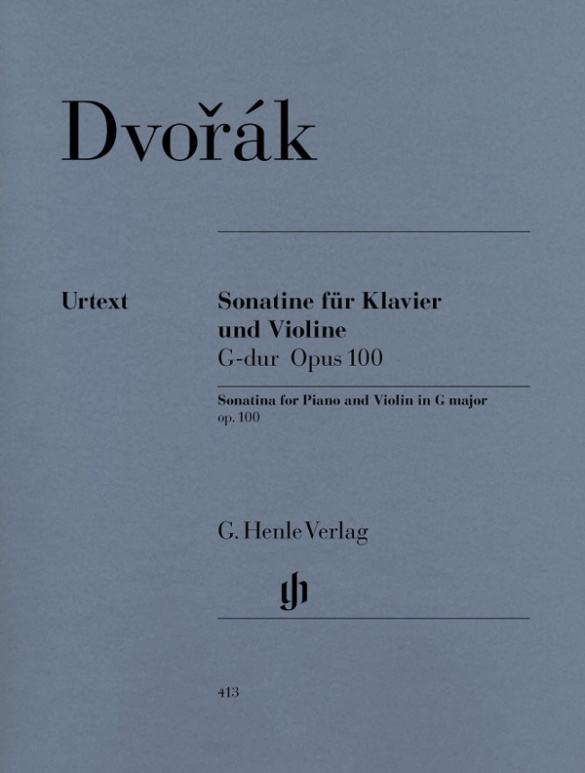

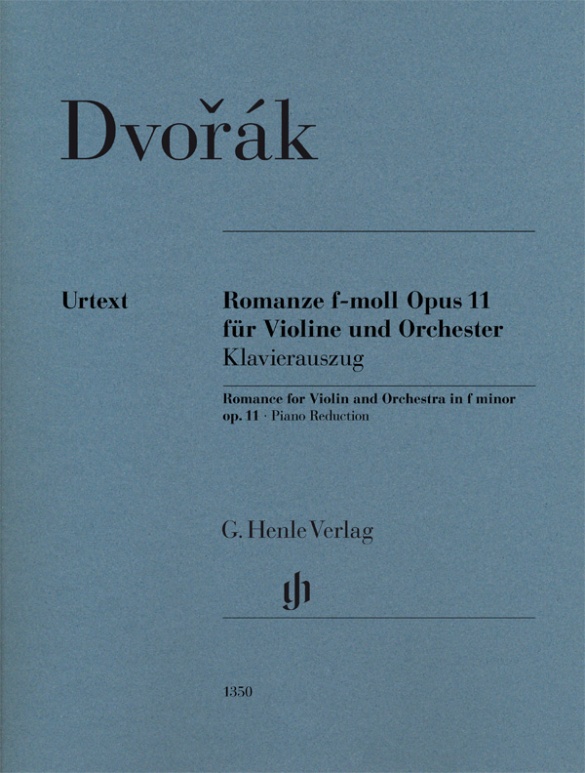
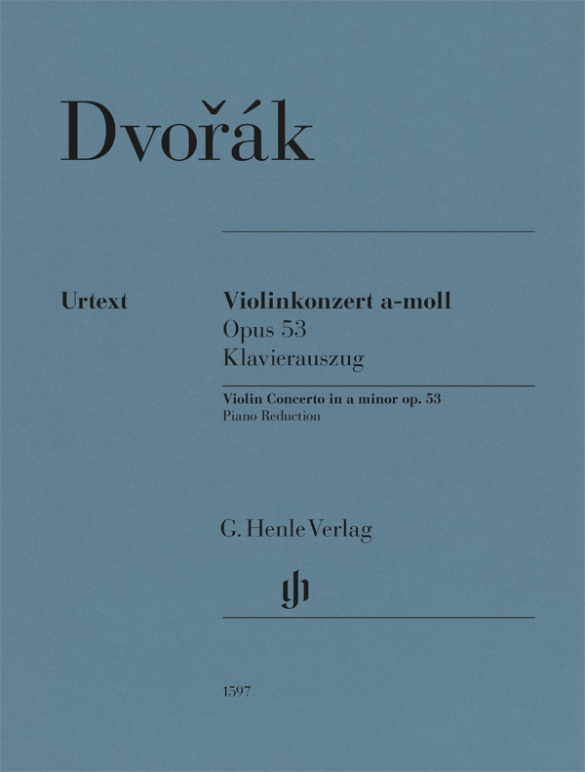
parties avec ou sans indications de doigté